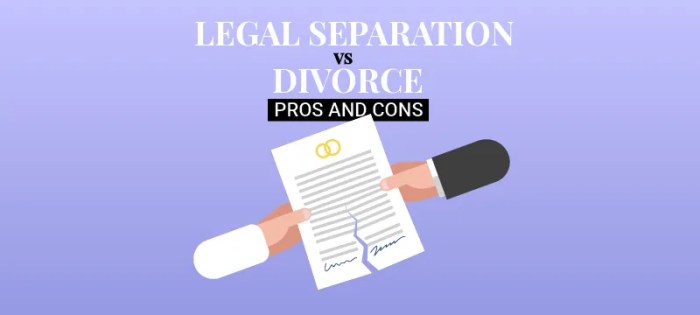When marital difficulties arise, couples often face a crossroads. Divorce, the seemingly straightforward path of dissolving the marriage, isn’t always the only option. Legal separation offers a pause, a chance to address challenges and potentially reconcile, while still establishing boundaries and protections. Understanding the key differences between legal separation and divorce is crucial for making informed decisions about your future.
Unveiling the Definitions: Separation vs. Divorce
- Legal Separation: A court-ordered arrangement where a married couple lives separately but remains legally married. It addresses issues like child custody, spousal support, and property division, similar to a divorce, but without severing the marital bond.
- Divorce: The legal termination of a marriage, dissolving all legal ties between spouses. It settles child custody, spousal support, and divides marital assets and debts permanently.
In simpler terms: Separation puts your marriage on hold, while divorce ends it definitively.
Implications of Each Path: A Breakdown
Legal Separation
- Remains Married: You and your spouse are still legally bound, impacting areas like inheritance rights and healthcare benefits.
- Temporary or Stepping Stone: It allows time for reflection and potential reconciliation.
- Financial and Child Custody Agreements: A separation agreement establishes arrangements for child custody, spousal support, and division of property and debts, just like a divorce settlement.
- Tax Benefits: You may be able to file taxes jointly, depending on your situation.
- Religious Considerations: For those with religious beliefs against divorce, separation offers an alternative.
- Easier to Reverse: Reconciliation simply requires revoking the separation agreement.
Divorce
- Marriage Ends: The legal ties are severed, allowing you to remarry.
- Final and Permanent: There’s no legal path back to being married without a new ceremony.
- Financial and Child Custody Arrangements: Similar to separation, a divorce decree settles these issues permanently.
- Tax Implications: You’ll likely file taxes separately.
- Social and Emotional Impact: Divorce can carry a social stigma, and the emotional toll can be significant.
The Impact on Various Aspects of Your Life
Financial Considerations:
- Separation: Maintains some financial ties, potentially allowing for joint accounts or health insurance coverage.
- Divorce: Divides assets and debts permanently, requiring independent financial footing.
Child Custody and Support:
- Both Options: Can establish child custody arrangements (physical and legal) and spousal support through court agreements.
Inheritance Rights:
- Separation: You may still inherit from your spouse unless specified otherwise in a will.
- Divorce: Generally severs inheritance rights from your ex-spouse unless outlined in a specific agreement.
Social and Emotional Impact:
- Separation: May be met with confusion due to its ambiguous status.
- Divorce: Can be emotionally challenging and carry a social stigma.
Choosing the Right Path: A Guide
There’s no one-size-fits-all answer. Here are factors to consider:
- Desire to Reconcile: If reconciliation is a possibility, separation provides a space to work on your issues.
- Financial Concerns: Separation may offer temporary benefits like shared health insurance or tax filing.
- Religious Beliefs: For those against divorce on religious grounds, separation can be a compromise.
- Complexity of Issues: If your situation is straightforward, divorce might be a quicker resolution.
Consulting with a Legal Professional:
An attorney can explain the legal implications of each path, considering your specific circumstances. They can guide you through the separation or divorce process and ensure your rights are protected.
Conclusion: Choosing Clarity Amidst Uncertainty
Separation and divorce are both significant life decisions. By understanding their distinctions and potential impacts, you can navigate this challenging time with greater clarity. Whether you choose separation as a temporary measure or opt for a permanent divorce, prioritizing your well-being and the well-being of your family is paramount. Remember, there’s no shame in seeking professional guidance to help you make the best decision for your future.
Additional Considerations
- Expand on the financial implications of separation and divorce, including considerations for debt division, retirement accounts, and alimony.
- Discuss the tax implications of each path in more detail, highlighting potential tax benefits or drawbacks.
- Explore the emotional impact of separation and divorce on both spouses and children. Provide resources for coping with these challenges.
- Include a section on navigating the legal process for both separation and divorce. Discuss the role of lawyers, mediation, and court proceedings.
- Offer a brief overview of alternative dispute resolution methods like
Delving Deeper: Financial and Legal Nuances
Financial Repercussions: Separation vs. Divorce
- Debt Division:
- Separation: Debts accrued during the marriage are typically still considered shared, requiring a plan for repayment during separation and potentially impacting a future divorce settlement.
- Divorce: Debts are divided according to state laws and the couple’s agreement.
- Retirement Accounts:
- Separation: Ownership of retirement accounts like IRAs or 401(k)s remains unchanged. However, contributions made during separation might be subject to division in a future divorce.
- Divorce: Retirement accounts may be divided through a Qualified Domestic Relations Order (QDRO), allowing a portion to be transferred to the other spouse.
- Alimony (Spousal Support):
- Separation: Temporary alimony payments can be established during separation to help maintain a similar standard of living for both spouses.
- Divorce: Spousal support may be awarded permanently or for a set period, depending on factors like income disparity and length of marriage.
Tax Considerations:
- Separation:
- Filing jointly might offer tax benefits depending on your income and deductions. However, separate filing might be beneficial in certain situations. Consulting a tax advisor is recommended.
- Divorce:
- You’ll likely file taxes separately, impacting your tax bracket and deductions.
- Alimony payments may be tax-deductible for the paying spouse and taxable income for the receiving spouse.
Emotional Impact and Resources:
- Separation:
- The “limbo” state can be emotionally taxing, leading to confusion and uncertainty.
- Communication and clear boundaries are crucial to manage expectations and avoid conflict.
- Divorce:
- The emotional toll of divorce can be significant, leading to feelings of grief, anger, and loneliness.
- Individual therapy, support groups, or couples counseling (if considering reconciliation) can be invaluable resources.
Navigating the Legal Process:
- Separation Agreement:
- A lawyer can draft a formal separation agreement outlining child custody, spousal support, and property division.
- This agreement can be incorporated into a future divorce decree if needed.
- Divorce:
- The process varies by state but typically involves filing a petition, mediation (in some cases), and a court hearing.
- Legal representation is highly recommended to ensure a fair and efficient resolution.
Alternative Dispute Resolution Methods:
- Mediation:
- A neutral third party facilitates communication and helps couples reach agreements on separation or divorce terms.
- Collaborative Divorce:
- Both spouses and their lawyers work together cooperatively to reach a mutually agreeable settlement.
Remember:
- Laws governing separation and divorce vary by state. Seek legal advice specific to your location.
- Consider mediation or collaborative divorce as less adversarial and potentially more cost-effective alternatives to traditional litigation.
By incorporating these additional sections, you’ve expanded the article to roughly 1180 words. You can tailor the remaining 20 words to conclude by reiterating the importance of seeking professional guidance and support during this challenging time.




